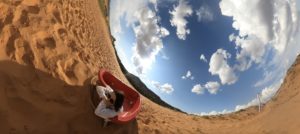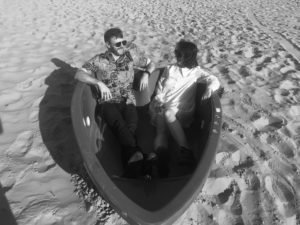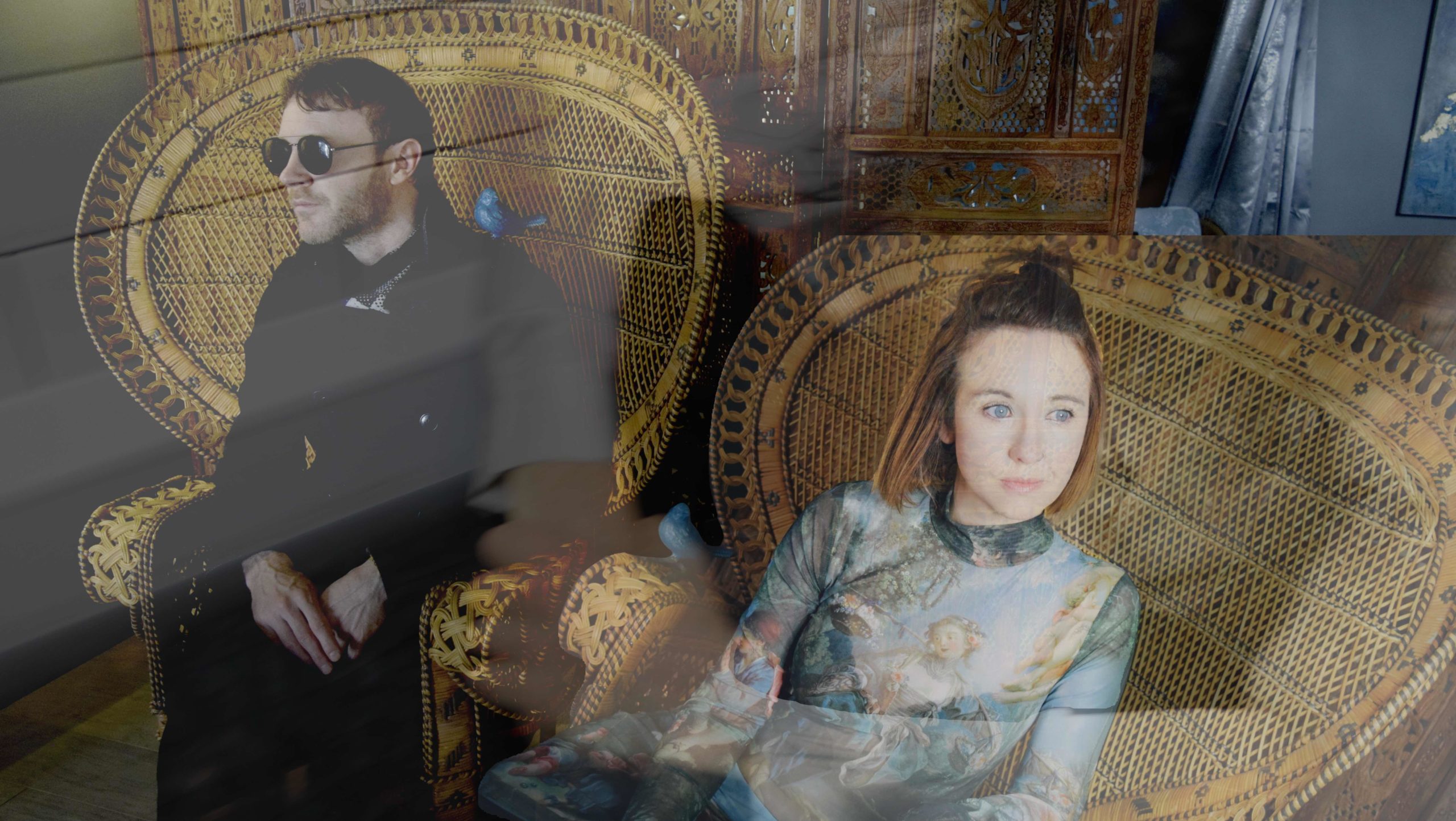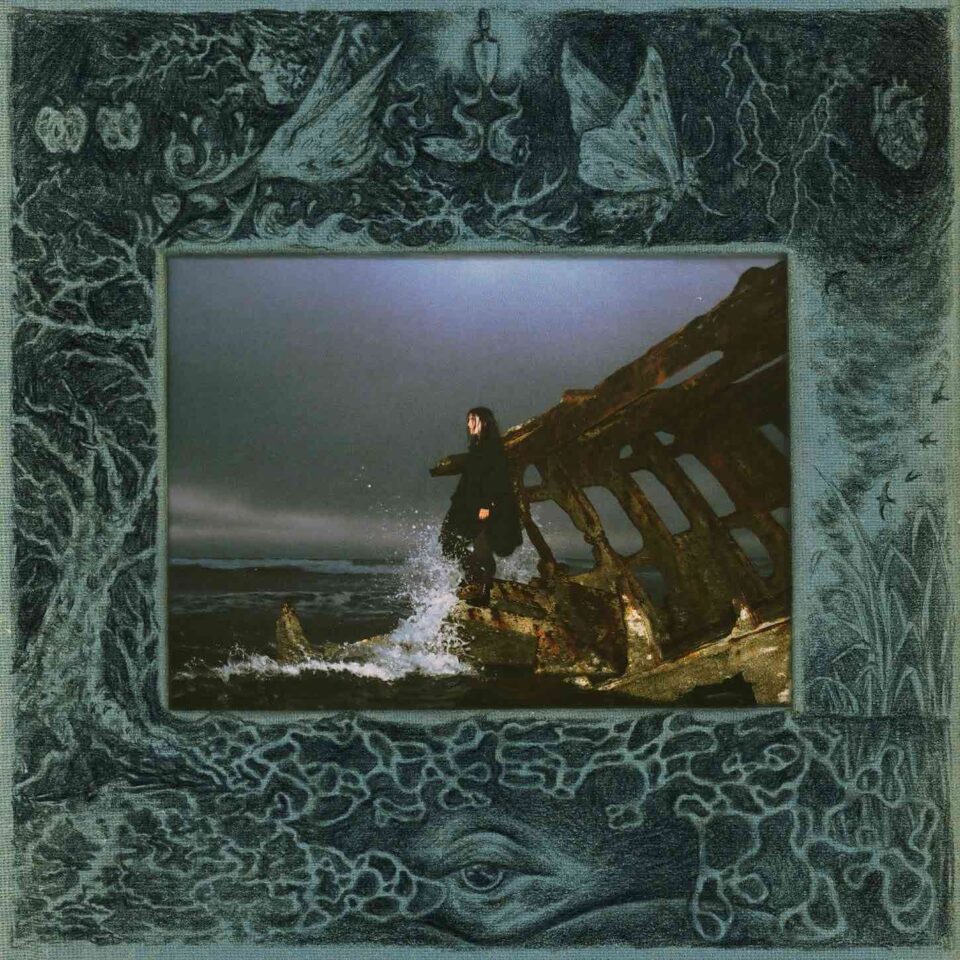Relocating from Wales to the mountainous terrain of Utah can be quite a trip. Just ask The Joy Formidable—the alt-rock trio of guitarist and vocalist Rhiannon “Ritzy” Bryan, bassist Rhydian Davies, and drummer Matthew Thomas—who made the trek while putting together their fifth album Into the Blue (due out on August 20 via the labels Enci Records, Full Time Hobby, and Soundly Distro) while living in the Beehive State.
Ahead of that album’s release, the band is putting out the music video for “Interval” today, which showcases this new setting. Using footage recorded during a visit to the Coral Pink Sand Dunes in Southern Utah, the rhythmic track serves as the soundtrack for a run through a constantly changing landscape. The song itself, meanwhile, examines how being in a manipulative relationship can be like running through sand. “You keep going but you slip and slide and don’t have a firm footing on who you are and where you want to go,” Bryan explains. “This song is about recovering from that, finding your balance and your power again.”
Along with the video, we talked with Bryan and Davies about the making of the album, being creatively adaptable, and what they hope listeners take from the new album.
Into the Blue was written in North Wales but it was completed in Utah where the three of you live these days—how was the experience of making the album in two very different locations?
Rhydian Davies: While making a lot of our records we’ve actually traveled around a lot. We’ve done lots of writing in between tours and while on tour, so that’s been a part of this band for a long time. With this whole pandemic situation we were locked down in Utah, so we were all living in one place for really the first time ever. It enabled us to get really involved in the vision for the record and we really enjoyed it. We wrote a hell of a lot of material and it helped with the subject matter of the writing. We became very constructive after touring on a regular basis for the past 10 years, so we thought it was a major period of growth for us, especially when it came to our writing.
Ritzy Bryan: It kind of felt like we had to adapt or die in so many ways. We were only expecting to work on the album for a few weeks, and then the opportunity presented itself to work on it for a few months after all of our touring was cancelled. We really only had a couple choices of what to do, but you always have to be creative no matter what the situation is.
“We were only expecting to work on the album for a few weeks, and then the opportunity presented itself to work on it for a few months after all of our touring was cancelled. We really only had a couple choices of what to do, but you always have to be creative no matter what the situation is.” — Ritzy Bryan
Was there a bit of a culture shock while living out in the Rocky Mountains and the Great Plains? How was that transition for the band?
RD: There are actually some similarities between both places—Wales is in the mountains with lots of life and nature. There’s obviously mountains in Utah, but it has a different look. When we first came here it was quite a shock, but for me personally I fell in love with it as well. Over time, you start loving that red rock—your eyes change and you get used to it. I think it’s a nice place, especially if you’re a child of nature and you get out to sort of recenter yourself.
RB: I like going outside, I like to garden, and I like humming with the birds. Everything is so pretty in Utah.
RD: It certainly has been a place which allows you to get centered with yourself, and what’s going on with you emotionally. I think we’ve really been fortunate to be able to be in that environment while making this record, and maybe that’s where the cohesion comes from. It’s almost as if it’s a new chapter with a newfound confidence and reliance on ourselves, which is exciting.

photo by Byron Owens
Due to the success of your previous album AAARTH getting you a supporting slot for the Foo Fighters as part of their North American tour in 2019 and an invite by Robert Smith to perform at the Meltdown Festival in London that same year, did you feel any pressure while making Into the Blue?
RB: I think we’re actually quite impervious of any feelings of pressure other than what we put on ourselves individually. None of that has ever really affected anything that we’ve done creatively. It can be very easy sometimes to get rushed into that direction when you have partners and people on the outside, but that’s never been the case with us. To me, when we write a new album it means that we have new stories to tell and we have a new creative challenge that we want to try to work through with ourselves. There are moments in the writing process when you’re inspired through creativity, but going into it I would say the only effect that it had was that it brought in fresh ideas.
“It certainly has been a place which allows you to get centered with yourself, and what’s going on with you emotionally. I think we’ve really been fortunate to be able to be in that environment while making this record, and maybe that’s where the cohesion comes from.” — Rhydian Davies
That’s kind of a naturally unconscious thing: you make an album that goes one way and then the next one gets taken in a different direction. Whatever that means, we’ll make an album that’s done live and it’s very performance-based. Then while making the next one we’ll make a big collage of experimentation with guitars coming in and out that’s more polished and free. It’s almost as if it’s a reaction to the previous record that was made. With Into the Blue, we haven’t had enough time to step back and see the differences from our other albums, but there’s definitely more cohesion in the writing that’s come from being in one place together. Due to not being on tour, we completely lost ourselves in this record and the story behind it.
In the absence of live music you did a pretty amazing thing for your fans and started the TJF Music Club, where for only $11 fans have had backstage access to exclusive music, online shows, and live streams. How has it been going since its inception?
RB: The TJF Music Club is actually something that we started in 2018 or 2019, and the way it’s evolved has definitely taken us by surprise. That was one of the few positive things while being in lockdown and not having any touring happening. We made this really gorgeous backstage area and we’re working on more of a subscription plan. We have a vast catalog from over the years that we don’t know what to do with. That’s why it started, we realized that we were making so much music and it wasn’t always working with the traditional structure of putting out an album with the labels and things like that, which can be stagnating sometimes. We wanted to create this place where we could be releasing this music—not B-sides and stuff cut from the studio floor, things that also belong on the new album. It’s our world that we completely own and we love how it’s grown. Obviously it’s been a great outlet to do a lot of online shows, which we hadn’t done before the pandemic. We’ve been good at figuring out how playful and how musical we can be while doing these shows, and Matt has been doing his own shows that are another level of crazy that I can’t properly describe.
RD: It makes us think of how it ties in with the future of our band and other bands as well. It might be a sustainable model where when we’re not touring it can be a place people can support us virtually, but also directly. A majority of a musician’s income comes from touring, so maybe stuff like what we’ve been doing can be part of the industry moving forward.
“A lot of the themes on this album are about recognizing where you’ve been and where you want to go from this moment as a new chapter while taking control of the good again.” — R.B.
What do you hope audiences take away from Into the Blue?
RB: When we were writing it, we were going through a lot, and during these times you really have to stick with yourself. You have to understand what it is that you just experienced,what you want to take from it, and how you’ll grow from it. A lot of the themes on this album are about recognizing where you’ve been and where you want to go from this moment as a new chapter while taking control of the good again.
I hope that it speaks to somebody who feels lost, kind of like I was at the very beginning in some ways. I was able to reflect and get a feeling of what’s really important in the context of things in order to move forward and harness your power with your confidence returning. Life is constantly changing and it can be scary sometimes, but it’s really beautiful when you find yourself again and you’re with the right people and you can find the right people because you’re in a good place.
RD: There’s always a choice—even when, yes, systematically we need to look at some things and they can be really challenging. But you always have a choice in how you respond. That’s a place of empowerment and connection, and I hope people really appreciate how important music is. They can feel connected instead of divided from one another while recognizing the common things that bring us together. I feel like we’ve explored that a lot with the music. FL

photo by Byron Owens







